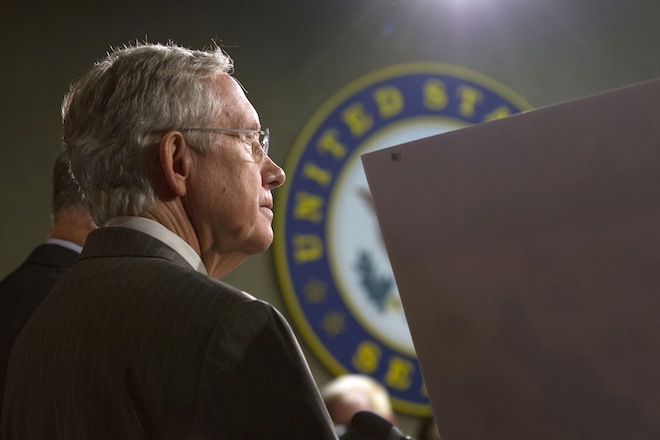Among historians, the knee-jerk reaction to Senate Majority Leader Harry Reid’s successful push on Thursday to execute the “nuclear option” to clear the path for all executive and most judicial nominees went like this: it’s the result of longstanding frustration with legislative gridlock.
The change, which alters the rules to require only a simple majority to proceed on judicial and executive branch nominees save those for the Supreme Court, historians say, is a big marker in the history of the Senate.
“We’ve only had a few times when the filibuster has been reformed. When they create the cloture rule in 1917. And the other big reform is in 1975 when they lowered the number needed to end a filibuster,” Julian Zelizer, a professor of history and public affairs at Princeton University told TPM on Thursday. “Since then, the use of the filibuster got worse, not better.”
“So since that last reform the filibuster was used more frequently. It was used as a routine matter of Senate politics and we’ve now reached a point where you’ve reached an essential requirement of 60 votes on everything which is not normative and breaks precedent,” he said. “And so I think the frustration has intensified, I think Democrats who now have control have reached the point where they’re willing to make the bet of setting this precedent both on how to change the rules of the Senate and also curtailing the filibuster in a particular area because of their inability to push legislation.”
American Enterprise Institute scholar Norm Ornstein said that Republicans brought it on themselves. “For whatever reason, the Republicans decided to go nuclear first, with this utterly unnecessary violation of their own agreement and open decision to block the president from filling vacancies for his entire term, no matter how well qualified the nominees,” Ornstein told TPM by email. “It was a set of actions begging for a return nuclear response.”
Obstruction over the last few decades through the filibuster has been a major part of the story of the Senate, George Washington University Political Science professor Sarah Binder, who specializes in Senate procedure and filibuster rules, said.
“I think if there’s a story of the Senate over the last two, three decades it’s this increasing willingness of the opposition party — whether it’s Democrats or the Republicans — to exploit the rules that exist and to use them to defeat policy initiatives to the majority and derail the nominations,” Binder told TPM. “So the fact that Republicans keep sort of finding seemingly new ways to exploit the filibuster against particular nominations in some sense is kind of this procedural arms race where each party keeps ratcheting up the pressure.”
Binder added that the change is likely a culmination of Reid’s “frustration of the majority with the minorities unwillingness to be tamed.”
It’s not clear though if Reid’s decision to invoke the “nuclear option” is the beginning of a series of changes that would essentially neuter the filibuster as a procedural move all together.
University of California at Berkeley history professor Eric Schickler expects the changes on Thursday to be the first of a few to the filibuster.
“My view is by doing it this way I think that it would be surprising if this is a sustainable kind of equilibrium — where you just have majority rule for judges below the Supreme Court and nominations,” Schickler, who co-authored a book on the filibuster, told TPM. “I think the next time either the Democrats or Republicans are really frustrated and have legislation they want to pass they’ll expand it to that as well.”
Binder was more cautious. She said future changes to the filibuster depend on how Republicans respond to the new changes.
“Are they going to blow up every bridge in sight as they say,” Binder said. “Or, as Reid says, what more damage could they do? It depends on how minorities react and it depends on a new Senate. Who’s in the majority. I mean some people say this is just the first step and this is the end because it opens the door to future reforms like this. I think the minority likes the filibuster, I think majority members like the filibuster, so I don’t think that we’d necessarily see the demise of the filibuster all together.”






